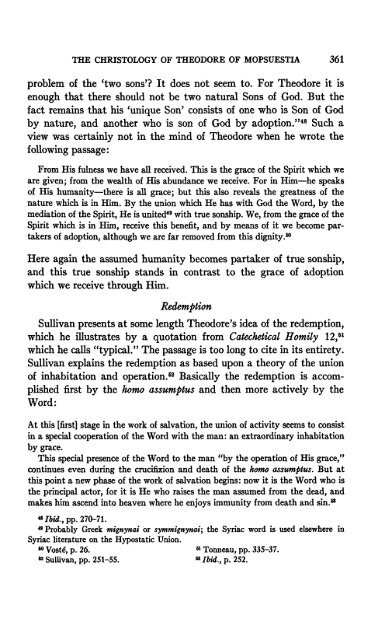ANNOTATIONS ON THE CHRISTOLOGY OF THEODORE OF ...
ANNOTATIONS ON THE CHRISTOLOGY OF THEODORE OF ...
ANNOTATIONS ON THE CHRISTOLOGY OF THEODORE OF ...
You also want an ePaper? Increase the reach of your titles
YUMPU automatically turns print PDFs into web optimized ePapers that Google loves.
<strong>THE</strong> <strong>CHRISTOLOGY</strong> <strong>OF</strong> <strong>THE</strong>ODORE <strong>OF</strong> MOPSUESTIA 361<br />
problem of the 'two sons? It does not seem to. For Theodore it is<br />
enough that there should not be two natural Sons of God. But the<br />
fact remains that his 'unique Son' consists of one who is Son of God<br />
by nature, and another who is son of God by adoption." 48 Such a<br />
view was certainly not in the mind of Theodore when he wrote the<br />
following passage:<br />
From His fulness we have all received. This is the grace of the Spirit which we<br />
are given; from the wealth of His abundance we receive. For in Him—he speaks<br />
of His humanity—there is all grace; but this also reveals the greatness of the<br />
nature which is in Him. By the union which He has with God the Word, by the<br />
mediation of the Spirit, He is united 49 with true sonship. We, from the grace of the<br />
Spirit which is in Him, receive this benefit, and by means of it we become partakers<br />
of adoption, although we are far removed from this dignity. 50<br />
Here again the assumed humanity becomes partaker of true sonship,<br />
and this true sonship stands in contrast to the grace of adoption<br />
which we receive through Him.<br />
Redemption<br />
Sullivan presents at some length Theodore's idea of the redemption,<br />
which he illustrates by a quotation from Catechetical Homily 12, 61<br />
which he calls "typical." The passage is too long to cite in its entirety.<br />
Sullivan explains the redemption as based upon a theory of the union<br />
of inhabitation and operation. 62 Basically the redemption is accomplished<br />
first by the homo assumptus and then more actively by the<br />
Word:<br />
At this [first] stage in the work of salvation, the union of activity seems to consist<br />
in a special cooperation of the Word with the man: an extraordinary inhabitation<br />
by grace.<br />
This special presence of the Word to the man "by the operation of His grace,"<br />
continues even during the crucifixion and death of the homo assumptus. But at<br />
this point a new phase of the work of salvation begins: now it is the Word who is<br />
the principal actor, for it is He who raises the man assumed from the dead, and<br />
makes him ascend into heaven where he enjoys immunity from death and sin. 88<br />
«Ibid., pp. 270-71.<br />
49 Probably Greek mignynai or sytnmignynai; the Syriac word is used elsewhere in<br />
Syriac literature on the Hypostatic Union.<br />
60 Voste*, p. 26.<br />
61 Tonneau, pp. 335-37.<br />
62 Sullivan, pp. 251-55.<br />
M Ibid., p. 252.
















